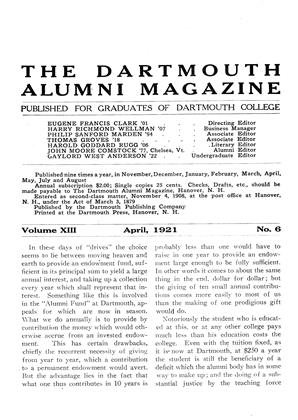The election of Dr. Ernest Fox Nichols, former president of Dartmouth College, as president of the Massachusetts Institute of Technology was announced by the corporation of the institute, March 31. He will take office July 1.
Dr. Nichols has been professor of physics at Yale University, and has been engaged in private research work for the last year. He will succeed the late Dr. Richard T. Maclaurin, who died more than a year ago.
Ernest Fox Nichols received his Bachelor of Science degree from Kansas Agricultural College and first studied as a graduate student at Cornell. He was given the degrees of 'Master of Science and Doctor of Science from this institution.
From 1892 to 1898, he was professor of physics and astronomy at Colgate, leaving there to come to Dartmouth in the same capacity. The position of professor of experimental physics attracted him in 1903 to Columbia, where he remained for some time.
A year as lecturer in Cambridge and London and a great deal of experimental work and research occupied his time up to 1909, when he was called to the presidency of Dartmouth College, upon the resignation of Dr. William Jewett Tucker.
Doctor Nichols came to Dartmouth when it had barely completed the growth that trebled its numbers in a decade. He found the problems before him those of business administration, of making the College an efficient public servant — and he solved them capably. During his stay, Dr. Nichols saw the College grow from 1100 to 1500.
When Dr. Nichols assumed the presidency of Dartmouth,, he expected that his administrative duties would allow him some time for further research in the field of physics. Finding such a division of attention impossible, he announced his resignation Nov. 21, 1915, explaining his desire for further investigatory work. He withdrew at the close of the.college year, June, 1916, leaving the College "an educational and administrative organization adequate and harmonious."
Since leaving Dartmouth, Dr. Nichols has been head of the physics department of Yale University, and lately has been interested in research work with the General Electric Company.
One of Dr. Nichols' most valuable contributions to his science was the discovery of the pressure of a light beam, made in 1901 while he was on the Dartmouth faculty.
Dr. Nichols is a member of several scientific societies and has made valuable contributions to the literature of his particular field.
 View Full Issue
View Full Issue
More From This Issue
-
 Article
ArticlePEN AND CAMERA SKETCHES OF HANOVER AND THE COLLEGE BEFORE THE CENTENNIAL
April 1921 By EDWIN J. BARTLETT '72 -
 Article
ArticleIn these days of "drives" the choice seems
April 1921 -
 Article
ArticleFRESHMAN MENTAL TESTS
April 1921 By CHARLES LEONARD STONE '17 -
 Sports
SportsBASKETBALL
April 1921 -
 Article
ArticleAMERICAN PROFESSORS AND STUDENTS RESENT CHARGES AGAINST FRENCH PEOPLE
April 1921 -
 Class Notes
Class NotesCLASS OF 1910
April 1921 By Whitney H. Eastman
Article
-
 Article
ArticleW. E. MONTSIE AWARDED LECTURESHIP IN FRANCE
June 1921 -
 Article
ArticleCOLLEGE RECEIVES HOVEY BUST AND MANUSCRIPT
January 1922 -
 Article
ArticleCrossing the Green
September 1986 -
 Article
ArticleThe Body's Friendly Fire
NOVEMBER 1993 -
 Article
ArticleGreen Jottings
JULY 1959 By CLIFF JORDAN '45 -
 Article
ArticleTroupers
November 1943 By Osmun Skinner '28


